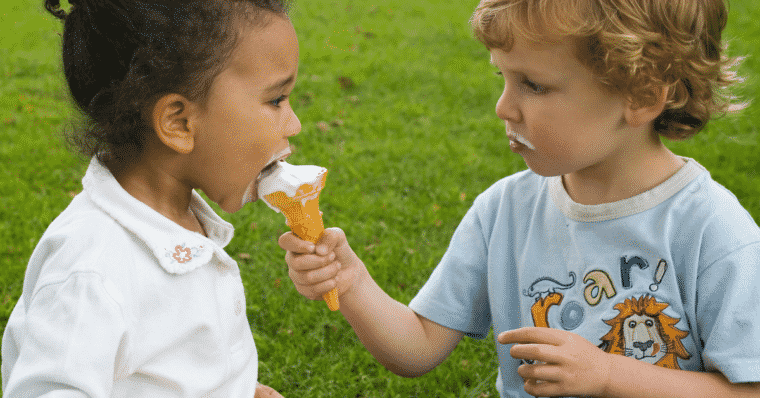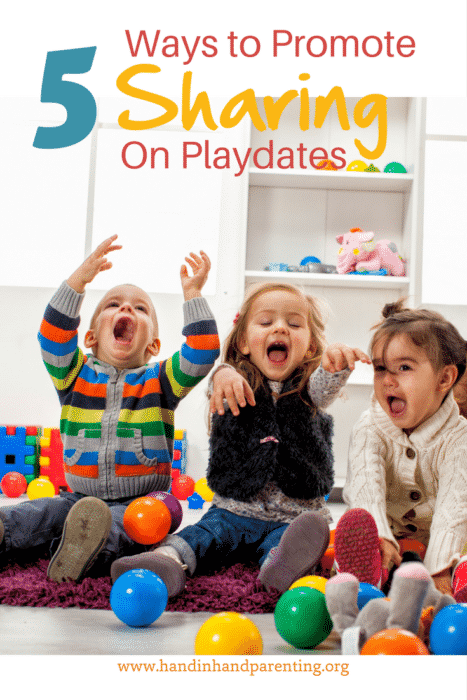![]()

Parenting can be all encompassing. It can seem to take us an age to figure out what we can accept and what our boundaries are at home, and then bam! We have to leave the house. What happens when your strategy for sharing between your siblings is working beautifully, but then you go to a friend's house or on a playdate and the rules look nothing like your own?
The strategy that resonates with us around sharing works like this:
Child 1: “I want that toy.”
Parent: “Your sister is playing with it right now. It'll be your turn when she's done.”
Child 1: “But I want it now! That's not fair.”
Parent: “I know. You want it now. She isn't done. I'll be here while you wait for it.”
At this point, Child 1 either moves onto something else, stays and cries with you, or the child with the toy decides she is done and offers it up.
Why This Simple Sharing Strategy Works:
This simple strategy works because it's clear and it's kind. The child playing with the desired toy gets to exercise her full attention and enthusiasm with that toy, until it no longer holds a fascination for her. The child waiting gets to unleash his full anger and outrage at having to wait, giving him a chance to unload any worries and stresses he's been holding (and are the most probable reason he is demanding toys, and melting down when you say no, anyways).
For more on why children's cries are useful in clearing blocked feelings read The Science Behind the Hand in Hand Tool of Staylistening.
If he is simply testing boundaries, probing what your policy on sharing is, you'll likely see him get interested in another toy. Either way, both your children get heard when you employ this sharing style.
Different Strokes: Switching the Rules
But this strategy does appear at odds in places where you hear these other policies:
“Let's take it in turns. You'll have two minutes, and then Child 1 will have two minutes.”
“You have this toy all the time. Child 1 is just visiting us. Let's let him play with your toy for now and you can have it when he leaves.”
“Oh! That's a favourite toy. He doesn't like to share that one.”
Or even,
“This toy belongs to the group. We all have to share.”
So, what can you do?
Here's the thing. Most disputes about sharing are not about the toy!
 Children often signal that their feelings are clouded and that they aren't feeling their usual light, confident selves by looking for your attention and sibling disagreements and fights over toys are a handy option for children looking for reassurance and connection.
Children often signal that their feelings are clouded and that they aren't feeling their usual light, confident selves by looking for your attention and sibling disagreements and fights over toys are a handy option for children looking for reassurance and connection.
When we get to a playdate or playgroup, the expectation can be that there are children to play together, and plenty of toys to go around. We are probably eager to get to some grown-up chat, and a cup of coffee, and we'd like children to play nicely – at least most of the time!
But moving into different or unfamiliar surroundings can trigger a child's feelings of unease and uncertainty, whether those feelings are directly related to the transition at hand, or from past times that have felt unsettling.
Snatching toys, hiding them, or refusing to share is a clear signal: “Help me here.”
When they do this, children are showing you that they need your attention, your kindness and your wise, grown-up guidance (even though the behavior looks like just the opposite).
Five Positive Things You Can Do To Promote Sharing On Playdates
Playdates can be a strain for children, with changes in structure and changes the rules. Here are five ways you can promote a positive playdate experience.
- Bump Up Connection Before You Leave
Earmark some time before you go out to connect and play together. Rough and tumble games when you give your child all the power work to keep your connection strong and your child's trust in you high.
Try telling her you have 100 kisses for her, if only she'll let you catch her, and then stumble and bounce off walls, missing her as she runs past giggling. Challenge her to pull your socks off while you try to pull hers off. Or play hide and seek and act continually surprised when she jumps out on you.
Or give him some Special Time, and tell him you will do whatever he likes or wants to play for 5-10 minutes, or up to 30 minutes if you can, and really let him lead this play without any outside distractions.
Both of these tools really give a child a good dose of closeness and connection before you leave. If they cry when you announce the end of the game or Special Time, listen to the upset as best you can, just as you do when they cry over the unfairness of a toy that is not free to be played with.
Find out How to Make the Most of Special Time with this Checklist
You'll get over the fuzz of emotions before you leave the house, and many times this will help your child feel more cooperative around other children.
2. Explain Different Rules
On your way to the playdate, preparing a child for something new can go 100 miles. Tell them what to expect, and that the rules are a bit different than at home. Let them know that if a child asks for a toy, then you will help find another toy to play with:
“If you are playing with another toy and a child wants it, please give it to him and we'll find you another.”
Having had a big chunk of time playing with you often makes children more agreeable to changes and requests.
3. Connect With Other Kids First
Set a tone that feels more relaxed from the start by spending some time with the other children. You can sit and just enjoy a few moments watching their play, or try being a bit jokey and playfully asking for their help. Pick up a baby doll, and ask “Why doesn't this dog bark?”
Or pretend to eat a piece of play food and find it disgusting. Ask them to make you something better. May be you'll add, “But please not noodles, because I cannot stand noodles, ” and then act outraged as they bring you a plate of noodles.
4. Try Different Rules, But Expect Disagreements
If an altercation comes up and you hear, “That's my car and I want it,” from a child, you can remind your child of the new rule, and see what happens. If you can find a super-duper new toy attraction, this is the time to introduce it. Or, you might even try showing your find to the child demanding the toy.
Often times though, because the disagreement is Not About The Toy, you will find yourself listening to some big feelings from your child – or someone else's.
Offer your ears, your lap and your support: “I know it's hard,” are good words.
Read: 20 Things to Say To Your Child Instead of Don't Cry for other ideas.
5. Or Try Out Your Sharing Strategy
Many times when parents are busy enjoying some rare grown up talk, they are actually happy to see another parent take charge and relieve them, so you could try the “I'll wait with you,” strategy with another child.
So you say calmly, “Kaylie, (or your child's name) is having a turn now, you can have a turn when she is finished,” and give the child a big warm smile. You might pick up another toy and ponder it, almost as a play invitation to the other child.
If they break down and you can signal to the parent that you are ok to listen and comfort their child, then you model your policy and why it works to other parents.
Sometimes there is no way to bridge a sharing strategy with another parent or a group, but with these ideas you keep offering the support your child needs to work through their feelings about it – and that is in the same kind, fair, listening style as the sharing policy you use at home.
Do any of the suggestions in this post feel like hot-button issues for you? Taking them to a listening partner before your next playdate will give you a chance to work through your own feelings and prepare to listen well. Find our more about how Listening Partnerships nurture us as parents in How Is Listening Time More Beneficial Than Talking with Mom Friends?
Get this guide for more Revolutionary Ideas That Make Parenting Less Stressful